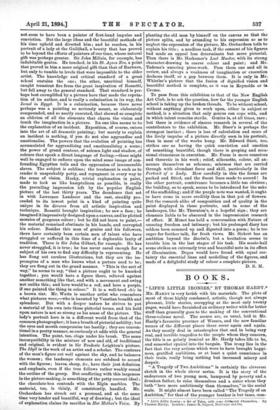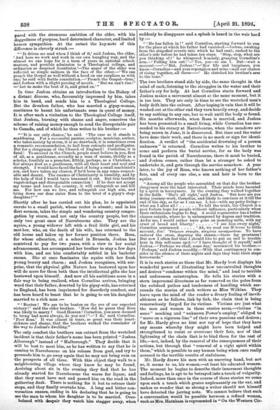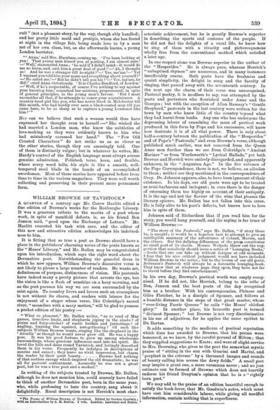BOOKS.
"LIFE'S LITTLE IRONIES," BY THOMAS HARDY.* MR. HARDY is very lavish with his materials. The plots of most of these highly condensed, artistic, though not always pleasant, little stories, occupying at the most only twenty pages, would have furnished an ordinary writer with far better stuff than generally goes to the making of the conventional three-volume novel. The scenes are, as usual, laid in Mr. Hardy's favourite province of Wessex, and the now familiar names of the different places there recur again and again. As they mostly deal in catastrophes that end in being very real, and terrible tragedies to the people whom they concern, the title is as grimly ironical as Mr. Hardy takes life to be, and somewhat cynical into the bargain. The irony lies in the fact that the very actions which were to have brought happi- ness, gratified ambitions, or at least a quiet conscience in their train, really bring nothing but increased misery and despair.
"A Tragedy of Two Ambitions" is certainly the cleverest sketch in the whole clever series. It is the story of the endeavours of two young men, hampered by poverty and a drunken father, to raise themselves and a sister whom they both "love more ambitiously than themselves," in the social scale. It might almost have been called "The Tragedy of an Ambition," for that of the younger brother is but tame, corn-
• Life's Little 11.011418 : a Set of Tales, toith soma Colloquial Characters, - By Thomas Hardy. London : James R. Osgood, Mellvame and Co, pared with the strenuous ambition of the elder, with his doggedness of purpose, hard determined character, and limited
human sympathies. At the outset the key-note of this difference is cleverly struck :—
"It drives me mad when I think of it,' said Joshua, the elder, And here we work and work in our own bungling way, and the utmost we can hope for is a term of years as national school- masters, and possible admission to a Theological college, and ordination as despised licentiates.'—The anger of the elder was reflected as simple sadness in the face of the other.—' We can preach the Gospel as well without a hood on our surplices as with one,' he said with feeble consolation.—' Preach the Gospel—true,' said Joshua with a slight pursing' of mouth. But we can't rise !' Let us make the best of it, and grind on."
In time Joshua obtains an introduction to the Bishop of a distant diocese, who, favourably impressed by him, takes
in hand, and sends him to a Theological College. But the drunken father, who has married a gipsy-woman, continues to haunt his unfortunate sons in quest of money. It is after each a visitation to the Theological College itself, that Joshua, burning with shame and anger, conceives the scheme of raising money enough to send the disreputable pair to Canada, and of which he thus writes to his brother :—
" It is our only chance,' he said. The case as it stands is maddening. For a successful painter, sculptor, musician, author, who takes society by storm, it is no drawback, it is sometimes even a romantic recommendation, to hail from outcasts and profligates. But for a clergyman of the Church of England ! Cornelius, it is fatal ! To succeed in the Church, people must believe in you, first -of all, as a gentleman, secondly as a man of means, thirdly as a scholar, fourthly as a preacher, fifthly, perhaps, as a Christian,— but always first as a gentleman, with all their heart and soul and strength. I would have faced the fact of being a small machinist's son, and have taken my chance, if he'd been in any sense respect- able and decent. The essence of Christianity is humility, and by the help of God I would have brazened it out. But this terrible vagabondage and disreputable connection ! If he does not accept any terms and leave the country, it will extinguish us and kill me. For how can we live, and relinquish our high aim, and bring down our dear sister Rosa to the level of a gipsy's step- 'daughter?"
shortly after he has carried out his plan, he is appointed -curate to a small parish, whose rector is absent; and in his first sermon, takes the simple and wondering country congre- gation by storm, and not only the country people, but the only two great ones of Narrobourne also. They are the *quire, a young widower left with a frail little girl, and his mot her, who, on the death of his wife, has returned to the old house and taken up her former position there. Rosa,
for whose education, at a school in Brussels, Joshua has contrived to pay for two years, with a view to her social advancement, has accompanied her brother to stay a few days with him, and see him comfortably settled in his bachelor 'rooms. She at once fascinates the squire with her fresh young beauty and charm ; and Joshua recognises, with sur-
prise, that the physical gifts Nature has bestowed upon her will do more for them both than the intellectual gifts she has bestowed upon himself. And now all his ambitions seem in a fair way to being realised, when Cornelius arrives, bringing word that their father, deserted by his gipsy-wife, has returned to England, has been imprisoned for disorderly conduct, and &as been heard to boast that he is going to see his daughter married to a rich man :—
" Beaten ! We are to be beaten on the eve of our expected victory ! ' said the elder brother. How did he guess that Rosa was likely to marry ? Good Heaven ! Cornelius, you seem doomed
to bring bad news always, do you not ! I do,' said Cornelius. 'Poor Rosa.' It was almost in tears, so great was their heart- sickness and shame, that the brothers walked the remainder of the way to Joshua's dwelling."
The only comfort the brothers can extract from the wretched incident is that their father's name has been printed "Joshua
Alborough" instead of " Halborough." They decide that it will be best to meet him, as he has written to say that he is coming to Narrobourne on his release from gaol, and try to /persuade him to go away again that he may not bring ruin on the prospects of all three. With this object they walk to a seighbouring village where they know he may be found.
Arriving about six in the evening they find that he has already started for Narrobourne the worse for liquor, and that they must have met and passed him on the road in the
gathering dusk. There is nothing for it but to retrace their steps, and they finally overtake him. A long and bitter con- versation ensues, ending in his declaring that he is going to iiee the man to whom his daughter is to be married. Over- helined, with despair they watch him stagger away, when suddenly he disappears and a splash is heard in the weir hard by :—
" He has fallen in ! ' said Cornelius, starting forward to run for the place at which his father had vanished.—Joshua, awaking from the stupefied reverie into which he had sunk, rushed to the other's side before he had taken ten steps. Stop. stop, what are you thinking of ? ' he whispered hoarsely, grasping Cornelins's arm.—' Pulling him out!'—' Yes, yes—so am I. But—wait a moment—'—' But, Joshua! Her life and happiness, you know—Cornelius—and your reputation and mine—and our chance of rising together, all three—' He clutched his brother's arm to the bone.'
The two brothers stand side by side, the same thought in the mind of each, listening to the struggles in the water and their father's cry for help. At last Cornelius starts forward and Joshua makes a movement almost at the same moment, but it is too late. They are only in time to see the wretched man's body drift into the culvert. After hoping in vain that it will be washed out at the other end they turn heavily away, and decide to say nothing to any one, but to wait until the body is found.
Six months afterwards, when Rosa is married, and Joshua has been presented to a small living, while Cornelius has suc- ceeded to his curacy at Narrobourne, when the meadows are being mown in June, it is discovered. But time and the water have done their work, and there is no mark or sign for identi- fication. A verdict of "the accidental drowning of a person unknown" is returned. Cornelius writes to his brother to come and perform the burial service, for as the body was found in the parish of Narrobourne, there it must be buried, and Joshua comes, rather than let a stranger be asked to undertake it, and gets through the service somehow. A year later, to the joy of Rosa, who knows nothing of her father's fate, and of every one else, a son and heir is born to the squire.
"Among all the people who assembled on that day the brother clergymen were the least interested. Their minds were haunted by a spirit in kerseymere. In the evening they walked together in the fields. She's all right,' said Joshua. But here are you doing journey-work, Cornelius, and likely to continue at it till the end of the day, as far as I can see. I, too—with my petty living— what am I after all P To tell the truth, the Church is a poor forlorn hope for people without influence, particularly when their enthusiasm begins to flag. A social regenerator has a better chance outside, where he is unhampered by dogma and tradition. As for me, I would rather have gone on mending mills, with my
crust of bread and liberty.' ' I see him every night,'
Cornelius murmured 'Ah, we read our H.brews to little account, Jos ! `INalLetve crravpbv, altrvirqs Karcupporicras. To have endured the cross, despising the shame,—there lay greatness ! But now I often feel that I should like to put an end to trouble here in this self-same spot.'—` I have thought of it myself,' said Joshua.—' Perhaps we shall, some day,' murmured his brother.— ' Perhaps,' said Joshua moodily.—With that contingency to con- sider in the silence of their nights and days they bent their steps homewards."
It is in such stories as these that Mr. Hardy best displays his wonderful power of illustrating how uncontrolled thoughts and desires "condense within the mind," and lead to terrible and unforeseen catastrophes. He tells his stories with a
stern impersonal directness as far removed as the poles from the subdued pathos and tenderness of handling which sur- rounds the stories of such writers as Miss Wilkins. They leave upon the mind of the reader a dreary feeling of inevit- ableness as he follows, link by link, the chain that is being remorselessly forged for its victims. Victims are just what the men and women in these stories seem,—victims "in some" mocking and "unknown Power's employ," obliged to "move on a rigorous line" of their own passions and desires ; for Mr. Hardy gives no hint nor ray of hope that they have any means whereby they might have been helped and strengthened to resist or overcome their fate, nor of that lightening of the chain that is to bind them for the rest of life,—not, indeed, by the removal of the consequences of their actions, but through that "renewal of a right spirit within them," which is possible to any human being when once really aroused to the terrible results of sinfulness.
Mr. Hardy draws his men with an unerring hand, but not so, it seems to us, his women,—at least his educated women. The moment he begins to describe their innermost thoughts and feelings, he is apt to be betrayed into a touch of vulgarity.
Indeed, more than once in the coarse of these stories we come upon such a touch which grates unpleasantly on the ear, and makes us wonder that so strong a writer should not himself have detected the jarring note. We cannot believe that such a conversation would be possible between a refined woman, such as Mrs. Harnham is represented in " On the Western Cir-. cult" (not a pleasant story, by the way, though ably handled), and her pretty little maid and protegee, whom she has found at night in the village fair, being made love to by a man
not of her own class, but, as she afterwards learns, a young London barrister.
"Anna,' said Mrs. Harnham, coming up. I've been looking at you! That young man kissedl you at parting, I am almost sure.' =Well,' stammered Anna ; 'he said if I didn't mind—it would do
me no harm, and, and, him a great deal of good iii, I thought so ! And he was a stranger till to-night P—' Yes, ma'am.'—' Yet I warrant you told him your name and everything about yourself P He asked me:—' But he didn't tell you his ? Yes, ma'am, he did !' cried Anna victoriously. It is Charles Bradford, of London.' —'Well, if he's respectable, of course I've nothing to say against your knowing him,' remarked her mistress, prepossessed, in spite of general principles, in the young man's favour. But I must reconsider all that, if he attempts to renew your acquaintance. A country-bred girl like you, who has never lived in Melchester till this month, who had hardly ever seen a black-coated man till you came here, to be so sharp as to capture a young Londoner like him !"
Ncr can we believe that such a woman would thus have expressed her thought even to herself She wished she had married a London man, who knew the subtleties of love-making as they were evidently known to him who had mistakenly caressed her hand." The "Few Old Crusted Characters" do not strike us as so clever as the other stories, though they are amusingly told. One of them is distinctly vulgar; but in whatever he writes, Mr. Hardy's control of the English language must always arouse genuine admiration. Polished, terse, keen, and flexible, where every word tells, his style is like a smooth, well- tempered steel blade in the hands of an accomplished swordsman. Most of these stories have appeared before from time to time in the various magazines. They were well worth collecting and preserving in their present more permanent form.




































 Previous page
Previous page